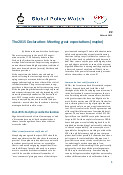The new Global Financing Facility – not a model for the Sustainable Development Goals
Published on Mon, 2015-06-29 00:00
While negotiations on Financing for Development and the means of implementation of the Sustainable Development Goals (SDGs) within the UN are deadlocked, a new Global Financing Facility (GFF) in support of Every Woman Every Child is going to be established outside of the UN. The creation of the GFF was initiated by the World Bank and the governments of Canada, Norway, and the United States, and announced at the UN General Assembly in September 2014. It will be officially launched in July 2015, at the third Financing for Development Conference in Addis Ababa, Ethiopia. The GFF is expected to play a key role in financing for reproductive, maternal, newborn, child and adolescent health (RMNCAH) and will serve as a major vehicle for financing the proposed SDG on healthy lives. It is being positioned as the most important new funding mechanism for the SDGs and the Post-2015 Agenda, similar to the Global Fund or GAVI. According to the World Bank:
Closing the funding gap The new facility aims to close the financing gap in RMNCAH spending, which is estimated to be around US$33.3 billion in 2015.2 It aims to mobilize additional funding through the combination of grants from a new GFF Trust Fund, financing from the International Development Association (IDA) and the International Bank of Reconstruction and Development (IBRD), the crowding-in of additional domestic resources, particularly from the private sector, and by “generating efficiencies through smart financing.”3 The architects of the GFF explicitly support the mix of public and private funding of health systems:
A total of 63 low- and lower-middle-income countries are eligible to receive GFF funding. In the first phase four “frontrunner“ countries (DR Congo, Ethiopia, Kenya, Tanzania) will receive funding. In the next phase five to ten additional countries will be selected.5 According to the GFF Business Plan, the GFF operates at country level through multi-stakeholder platforms, led by the national government but with the full involvement of the private sector, civil society, multilateral and bilateral donors and foundations.6 The existence of such a multi-stakeholder country platform is regarded as an indispensable eligibility criterion. Club governance outside the UN The World Bank plays a convening role for the GFF; and the GFF Trust Fund is fully integrated in World Bank operations, with a small secretariat based at the World Bank in Washington, D.C. However, the central decision-making body of the GFF will be the GFF Investors Group, a multi-stakeholder body with 20-25 representatives from participating countries, bilateral donors, multilateral institutions and partnerships, the private sector, private foundations, and NGOs. The concept of the GFF was developed under the guidance of the GFF Working Group, whose composition indicates what the membership of the GFF Investors Group may look like. The GFF Working Group was chaired by the Government of Norway, the United States Agency for International Development (USAID) and the World Bank, and had 28 members, including representatives of GAVI, the Global Fund, the Bill & Melinda Gates Foundation, and the UN Foundation.7 Only three governmental representatives from the global South were involved (Ethiopia, Burundi and DR Congo). Membership in the Committee will be limited to the donors in the Investors Group and its Chair or Vice-Chair. Current plans do not envisage any role for partner countries or civil society organizations from the global South. Nevertheless, the GFF will be instrumental in consolidating the role of the World Bank as a key financing institution for the Post-2015 Agenda, while leaving only a marginal role for the UN. Thus, the GFF in support of EWEC is a particularly striking example of the shift from inclusive multilateral decision-making within the UN to global club governance in exclusive “partnerships”. Members of the GFF Working Group International Organizations Governments – North Governments – South Foundations Partnerships NGOs Notes: References Download this briefing (pdf version) By Jens Martens. Source: Global Policy Watch (GPW). |
SUSCRIBE TO OUR NEWSLETTER



